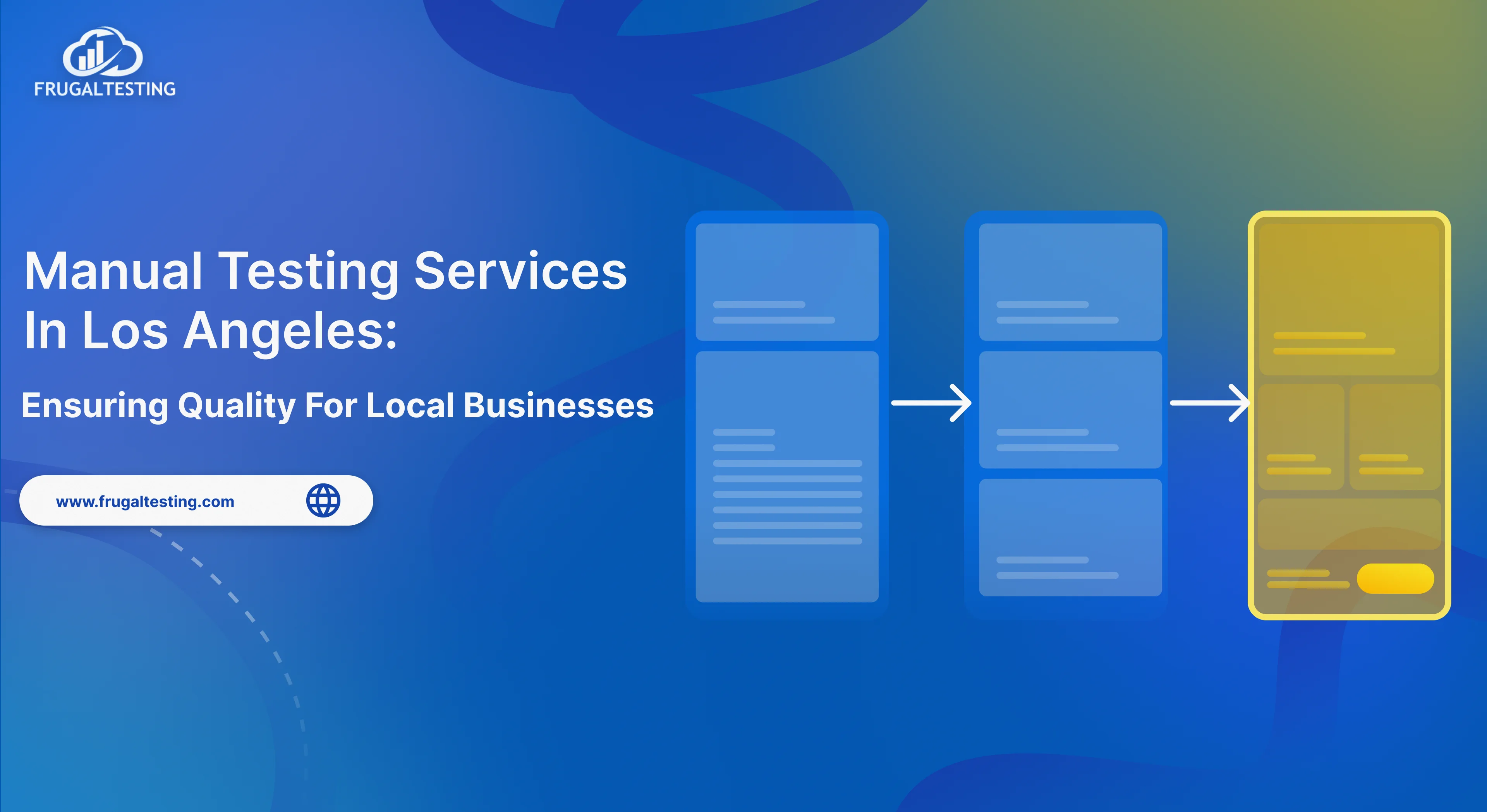In today’s competitive digital landscape, enterprises must deliver reliable, secure, and accessible software across industries like healthcare, e-commerce, and banking. Robust testing processes including manual testing, test automation, and automation frameworks - play a key role in achieving excellence.
Whether building a custom healthcare software development platform, scaling an e-commerce website, or launching an online banking application, software quality determines business success. This is where Independent Software Testing (IST) steps in, offering software quality assurance through functional testing, performance testing, and continuous testing.
💡 Key Areas Covered in This Blog:
📌 Understanding Independent Software Testing.
📌 Benefits of Independent Testing for Enterprises.
📌 Practical applications in healthcare, e-commerce, and banking.
📌 Proven strategies for integrating IST effectively.
📌 Future Trends in Independent Testing – AI, automation, and evolving enterprise QA needs.
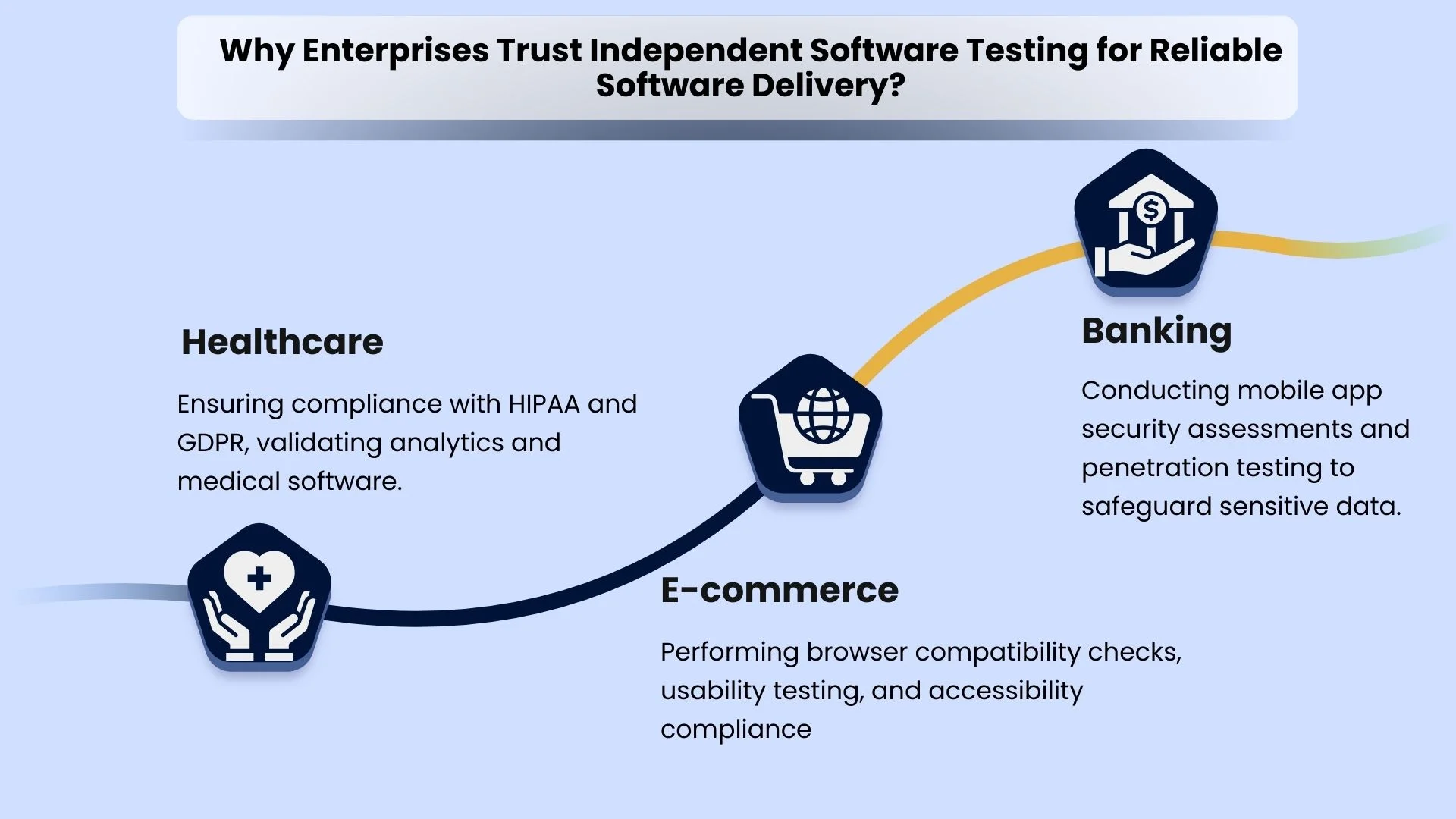
What is Independent Software Testing and Why Enterprises Need It?
Independent Software Testing (IST) involves third-party professionals ensuring software quality through automated testing, manual testing, and test automation frameworks. Unlike in-house teams, they provide unbiased insights into performance, functionality, and software quality assurance.
Healthcare platforms use IST for functional testing, system testing, and test environment validation. E-commerce businesses rely on browser compatibility testing, web accessibility testing tools, and user satisfaction reviews. Banking applications leverage mobile app security testing, cybersecurity penetration testing, and performance testing to protect sensitive data.
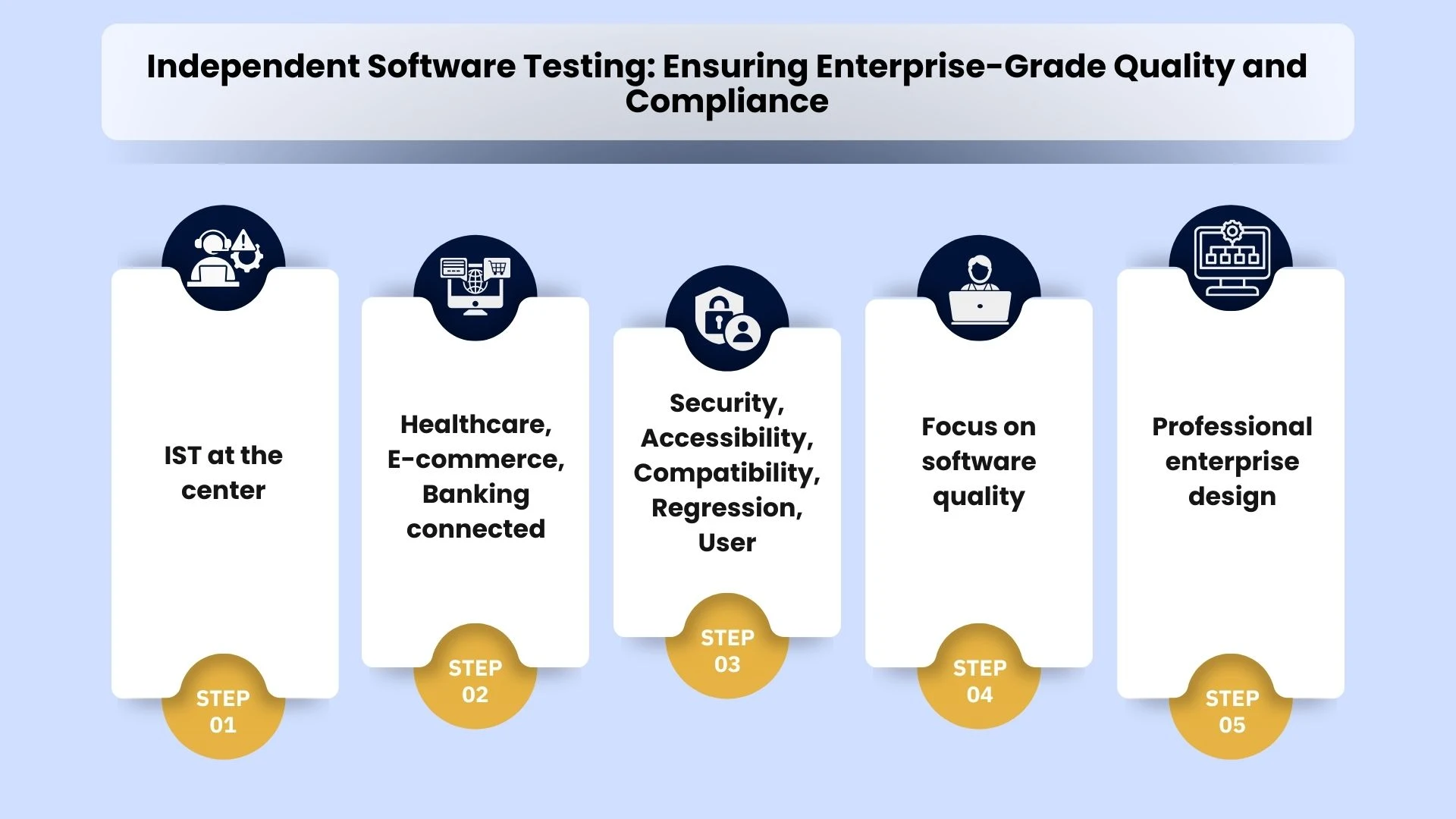
For example, a custom healthcare software development company relies on IST to verify healthcare compliance software and healthcare analytics software, ensuring HIPAA and GDPR adherence. Similarly, businesses in e-commerce website development use IST for browser compatibility testing online, user acceptance testing, and web accessibility testing tools like axe DevTools - web accessibility testing.
In financial services, online banking applications and mobile banking applications benefit from mobile app security testing and cyber security penetration testing to protect sensitive data. Enterprises also leverage system integration testing for complex architectures, and even in unrelated industries, topics like “how long does nicotine stay in your system for testing” illustrate the need for precision and clarity in testing methodologies across domains.
Key Benefits of Independent Testing for Large-Scale Enterprises
Independent testing delivers several key advantages for large enterprises:
- Unbiased Quality Assurance: Combines test coverage, load testing, and stress testing for accurate results.
- Specialized Expertise: Domain-specific QA processes for healthcare, e-commerce SEO, and business banking.
- Comprehensive Validation: Uses test scripts and test automation tools for functional testing, continuous testing, and test reports.
- Improved Customer Experience: Gains user satisfaction through user testing and test management techniques.
- Cost Efficiency: QA outsourcing optimizes resources using automated testing and automation frameworks.
These benefits make IST indispensable for enterprises building complex solutions like healthcare software development companies or e-commerce examples targeting global audiences.
How Independent Testing Ensures Unbiased Quality Assurance?
Unbiased quality assurance is crucial for software success. In-house teams often face project pressures, risking overlooked defects. IST addresses this by:
- Conducting regression testing definitions to ensure feature stability.
- Using browser compatibility testing tools and compatibility testing online for cross-platform functionality.
- Implementing cyber security penetration testing and mobile app security testing to identify vulnerabilities.
For example, a mobile banking application benefits from application security testing to safeguard transactions, while an e-commerce agency leverages web accessibility testing services for inclusive user experiences. Independent testers also use user testing jobs to collect diverse feedback, ensuring truly unbiased insights.
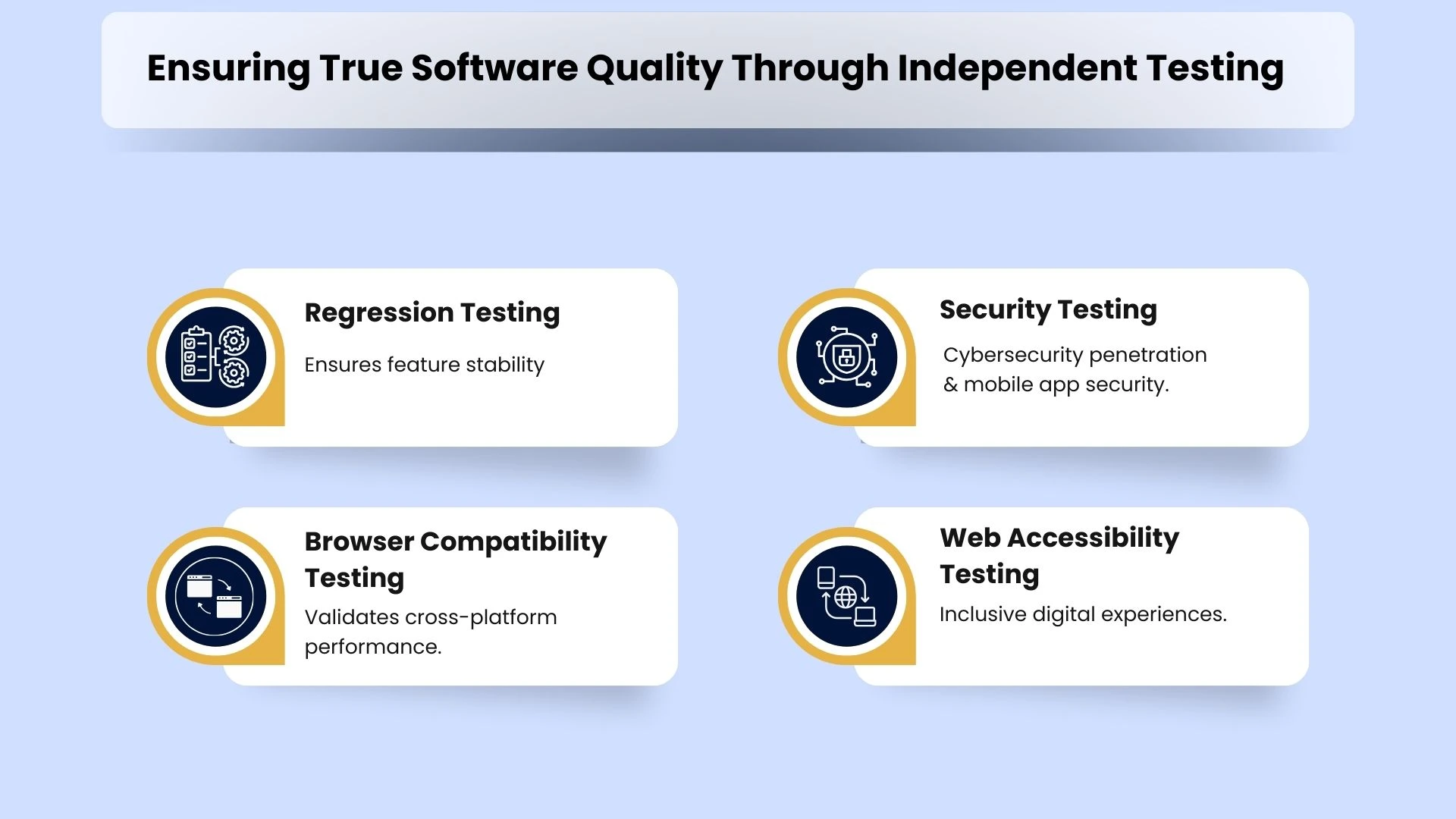
Independent testing ensures quality by separating evaluation from development, removing bias from defect reporting. It relies on standardized test plans, measurable acceptance criteria, and globally recognized QA practices such as ISTQB guidelines. By integrating functional, security, and accessibility testing with real-world user feedback, it validates both technical performance and customer satisfaction. This approach guarantees software that is stable, secure, and ready for diverse markets.
Real-World Use Cases: How Global Enterprises Leverage Independent Testing
- Healthcare: A custom healthcare software development company validates healthcare compliance software through system integration testing and security testing services.
- E-commerce: Retailers in e-commerce development use regression testing and axe DevTools - web accessibility testing to improve shopping journeys.
- Banking: Enterprises delivering business banking online applications employ web application security testing and mobile app testing to ensure safe, reliable services.
- Technology: SaaS providers implement user acceptance testing and browser compatibility testing online for global reach.
- Miscellaneous Industries: Even unrelated domains consider testing precision important, much like analyzing “how long does nicotine stay in your system for testing,” where accuracy ensures trust and compliance.
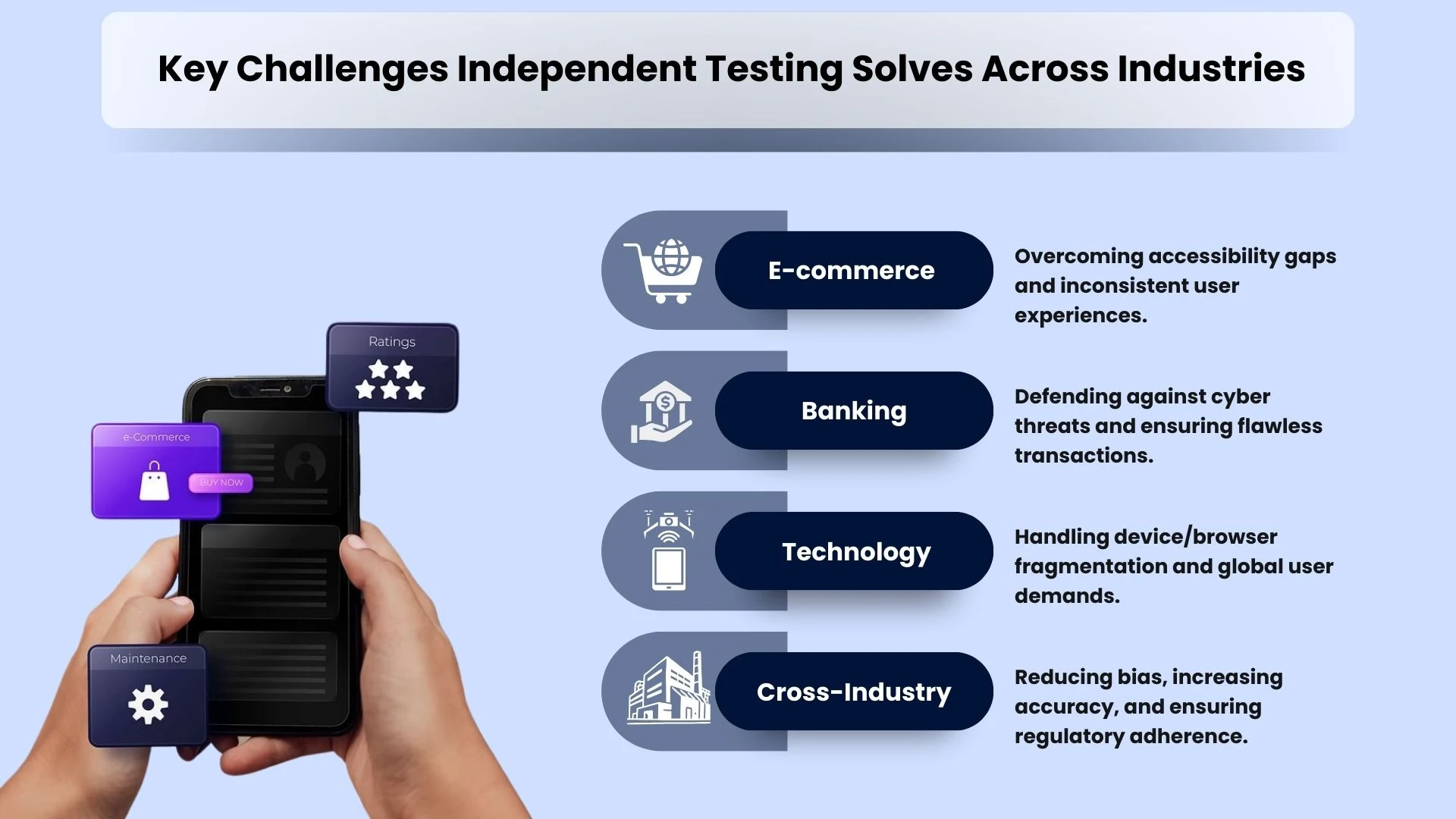
Cost Efficiency: Reducing Defects and Rework with Independent Testing
IST minimizes post-production costs by combining test automation, automation frameworks, and test management.
- Automated Regression Testing stabilizes frequent changes in e-commerce.
- Application Security Testing protects mobile banking applications.
- System Testing and performance testing identify early integration issues across testing environments.
For instance, healthcare CRM software validated independently avoids regulatory penalties, while e-commerce examples gain faster ROI by eliminating defects upfront.
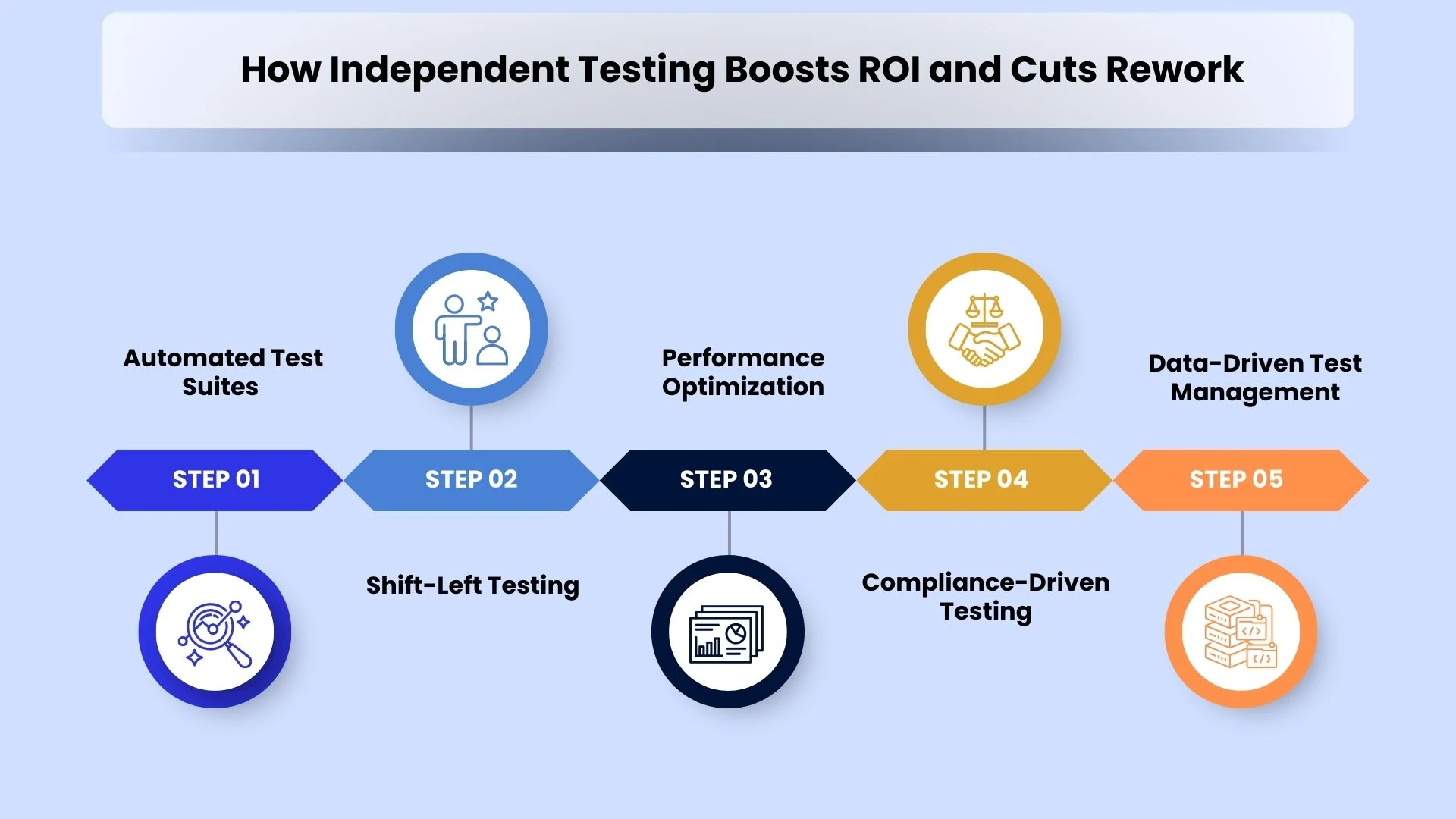
Independent Testing vs In-House Testing: Which Delivers Better Results?
While in-house teams provide product familiarity, IST ensures:
- Greater test coverage through automated testing and manual testing.
- Advanced test automation tools for functional testing and continuous testing.
- Scalability via QA outsourcing and agile development best practices.
For mobile app security testing and web application security testing, independent testing ensures higher accuracy, making it the better option for enterprises with complex ecosystems.
Role of Independent Testing in Digital Transformation Journeys
In digital transformation, independent testing plays a critical role in ensuring that new technologies meet quality, performance, and security standards while aligning with user expectations.
- Web Accessibility Testing Services - Guarantee inclusivity and compliance with global accessibility standards, essential for e-commerce platforms and healthcare portals.
- Mobile App Security Testing - Protect sensitive data in mobile banking, fintech, and healthcare applications, ensuring compliance with regulatory frameworks like GDPR and HIPAA.
- System Integration Testing - Validate seamless interoperability between legacy systems, cloud platforms, and IoT solutions to deliver a unified user experience.
- Performance & Load Testing - Ensure enterprise applications remain stable and responsive under high traffic during digital transformation rollouts.
- Automation in Continuous Testing - Leverage advanced test automation frameworks to support agile and DevOps-driven delivery pipelines.
By combining these practices, independent testing empowers enterprises to accelerate digital adoption, reduce risks, and deliver user-centric solutions without compromising on quality or compliance.
Independent Testing for Agile and DevOps Teams
Agile and DevOps require speed and quality:
- Regression Testing and load testing are automated using test automation tools.
- Continuous testing validates rapid releases across test environments.
- Agile methodologies and Agile SDLC integrate IST seamlessly into pipelines.
- Continuous Testing in CI/CD - Independent testing teams validate every build across multiple test environments, supporting rapid release cycles with minimal risk.
- Seamless Integration into Agile SDLC - IST blends into agile sprints, enabling early defect detection and faster feedback loops for development teams.
- Shift-Left Testing Approach - Testing activities begin earlier in the development lifecycle, preventing costly late-stage defects.
- Cross-Functional Collaboration - Independent testers work closely with developers, DevOps engineers, and product owners to maintain both functional quality and non-functional performance benchmarks.
IST integrates seamlessly, enabling custom healthcare software development companies and e-commerce fulfillment providers to release faster without compromising standards.
Enhancing Security and Compliance through Independent Testing
Independent testing plays a pivotal role in safeguarding applications, infrastructure, and sensitive data while ensuring adherence to regulatory frameworks. By using a combination of manual expertise and automated tools, organizations can identify vulnerabilities, patch them before exploitation, and meet compliance requirements like GDPR, HIPAA, PCI DSS, and ISO 27001. Regular testing not only prevents cyber threats but also instills customer trust and reduces the risk of costly penalties.
Ways to Enhance Security and Compliance through Independent Testing:
- Conduct penetration testing to simulate real-world attacks.
- Implement continuous vulnerability scanning for early detection.
- Perform secure code reviews to eliminate risks at the source.
- Validate compliance through regulatory audits and checklists.
- Leverage automation for continuous monitoring and faster remediation.
Role of AI and Automation in Independent Testing
AI and automation are revolutionizing Independent Software Testing (IST) by delivering faster, smarter, and more accurate results.
- Predictive Testing: Machine learning models analyze historical defects to predict high-risk areas, enabling proactive test planning.
- Intelligent Test Script Generation: AI optimizes and auto-generates test cases, reducing manual effort and human error.
- Performance & Functional Testing Enhancement: AI tools adapt to dynamic testing environments, improving test coverage for web, mobile, and enterprise applications.
- Automation Frameworks: Robust CI/CD-integrated automation frameworks accelerate regression cycles, delivering faster releases with minimal disruption.
- Enhanced Accuracy & Insights: AI-powered user acceptance testing, combined with automated mobile app security checks, ensures enterprises detect issues earlier and improve customer satisfaction.
AI-driven user acceptance testing and mobile app security testing ensure faster and more accurate insights for enterprises.
How to Meet Industry Regulations through Independent Testing?
Independent Software Testing (IST) ensures applications meet strict compliance standards across industries:
- Healthcare: Validates CRM, EHR, and compliance software for HIPAA/GDPR.
- Banking: Performs penetration and security testing to meet PCI DSS/ISO 27001.
- E-commerce: Uses accessibility tools to ensure ADA/WCAG compliance.
- System Testing: Verifies regulatory alignment across platforms.
- Security Testing: Protects data integrity and builds user trust.
Through system testing and application security testing, IST helps enterprises meet these regulations seamlessly.
How to Select the Right Independent Software Testing Partner?
Enterprises must choose partners based on:
- Domain Expertise: From custom healthcare software development to e-commerce fulfillment.
- Comprehensive Services: Offering mobile app testing, browser compatibility testing online, and security testing services.
- Advanced Tools: Usage of axe DevTools - web accessibility testing and free browser compatibility testing.
- Proven Track Record: Successful projects for banking applications and user testing reviews.
Best Practices for Implementing Independent Testing in Enterprises
Independent testing plays a critical role in ensuring software quality, security, and compliance. By adopting proven strategies, enterprises can detect defects early, reduce costs, and enhance user experience. The key is to integrate these practices seamlessly into the development and QA lifecycle.
Best Practices:
- Integrate system testing early into QA processes to identify and resolve issues before deployment.
- Use test automation tools for automated testing and regression testing to improve speed and accuracy.
- Perform web accessibility testing and functional testing to meet global compliance standards.
- Apply stress testing and load testing to ensure scalability and performance under peak loads.
- Ensure test management and QA outsourcing to maintain consistent quality and user satisfaction.
Future Trends: The Evolving Role of Independent Testing in 2025 and Beyond
By 2025, IST will evolve through:
- AI-Driven Regression Testing Meaning: Reducing human error for e-commerce website development.
- Continuous System Testing: Shift-right strategies for live mobile banking applications.
- Hyper-Personalized User Testing: Smarter user testing reviews powered by AI.
- Enhanced Accessibility: Wider use of axe DevTools - web accessibility testing for global compliance.
As industries expand, IST will remain essential for custom healthcare software development companies, e-commerce examples, and business banking online applications.
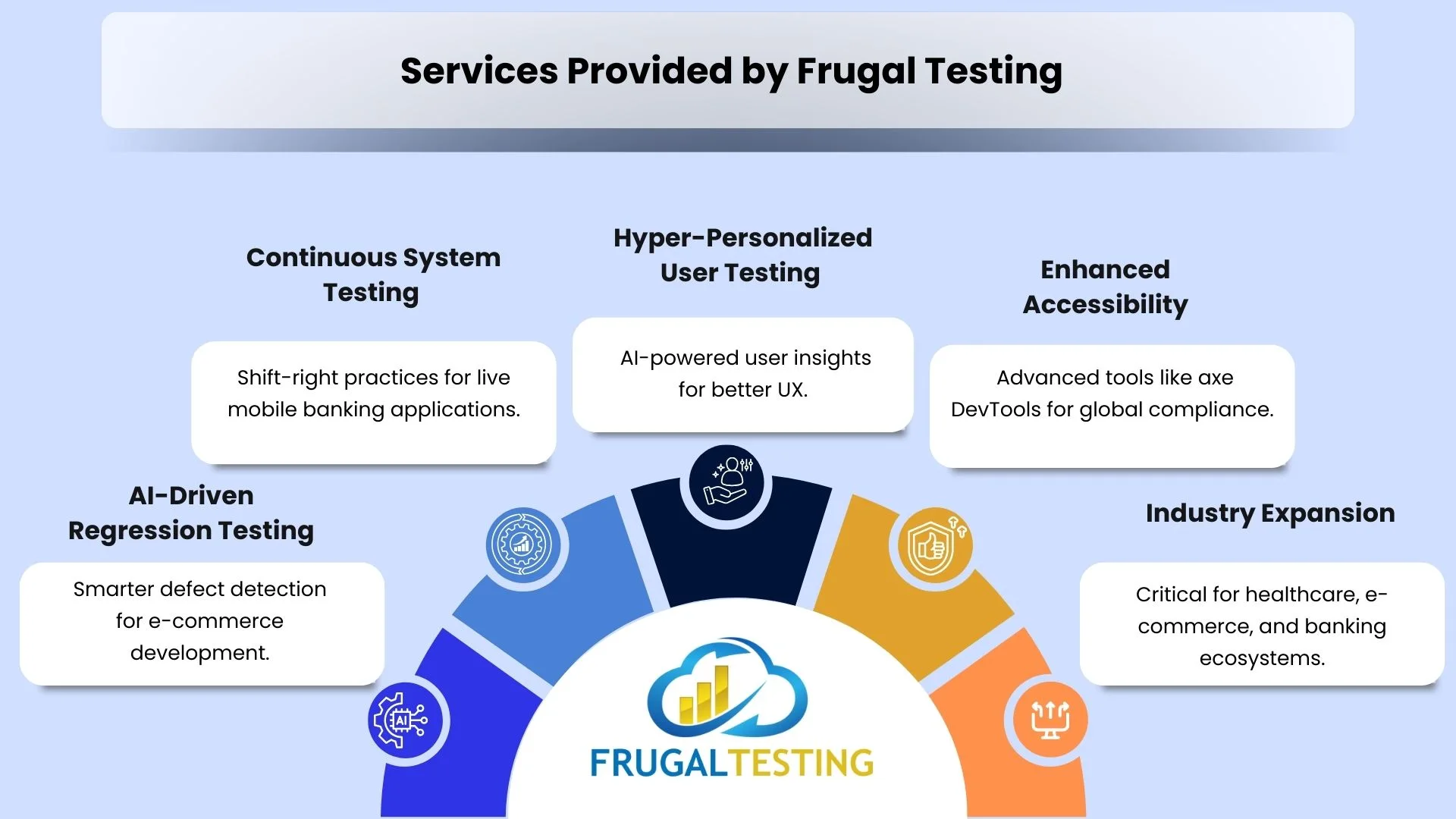
Conclusion - Best Practices and Optimization Tips
Independent Software Testing is a strategic driver for enterprise success. Whether delivering custom healthcare software development, optimizing e-commerce website development, or safeguarding an online banking application, IST enhances quality, reduces costs, and builds trust. By integrating mobile app security testing, web accessibility testing, system testing, application security testing, browser compatibility testing, regression testing, and user testing, enterprises prepare for a future where flawless digital experiences define market leaders.
Enterprises thrive by combining test automation, manual testing, and continuous testing within Agile methodologies. Automation frameworks, test scripts, and test environments ensure scalable quality. By aligning with QA outsourcing, software quality assurance, and customer satisfaction metrics, IST supports future-ready digital ecosystems.
- Combine browser compatibility testing tools and free browser compatibility testing for better reach.
- Conduct web application security testing to protect banking applications.
- Use regression testing definitions to stabilize e-commerce fulfillment systems.
- Implement system integration testing for healthcare analytics software.
- Include user testing jobs to enhance feedback cycles for mobile app testing.
Frequently Asked Questions (FAQs)
👉 Which type of testing simulates real-world scenarios and user interactions?
User Testing (User Acceptance Testing) simulates real-world scenarios and user interactions, often supported by system and exploratory testing.
👉What are the benefits of independent testing?
Independent Testing offers unbiased assessments, specialized expertise, better defect detection, cost savings, compliance, and improved user experience.
👉How does software testing lead to higher quality?
Software testing ensures higher quality by detecting defects early, validating requirements, improving reliability, strengthening security, and enhancing user experience.
👉How to improve quality of product in software testing?
Improve product quality by expanding test coverage, automating regression, shifting testing left, involving independent testers, gathering real-user feedback, and using advanced tools.
👉What is enterprise independent measures?
Enterprise Independent Measures are unbiased metrics like defect density, test coverage, security scores, and user satisfaction used by independent teams to evaluate software quality and compliance.



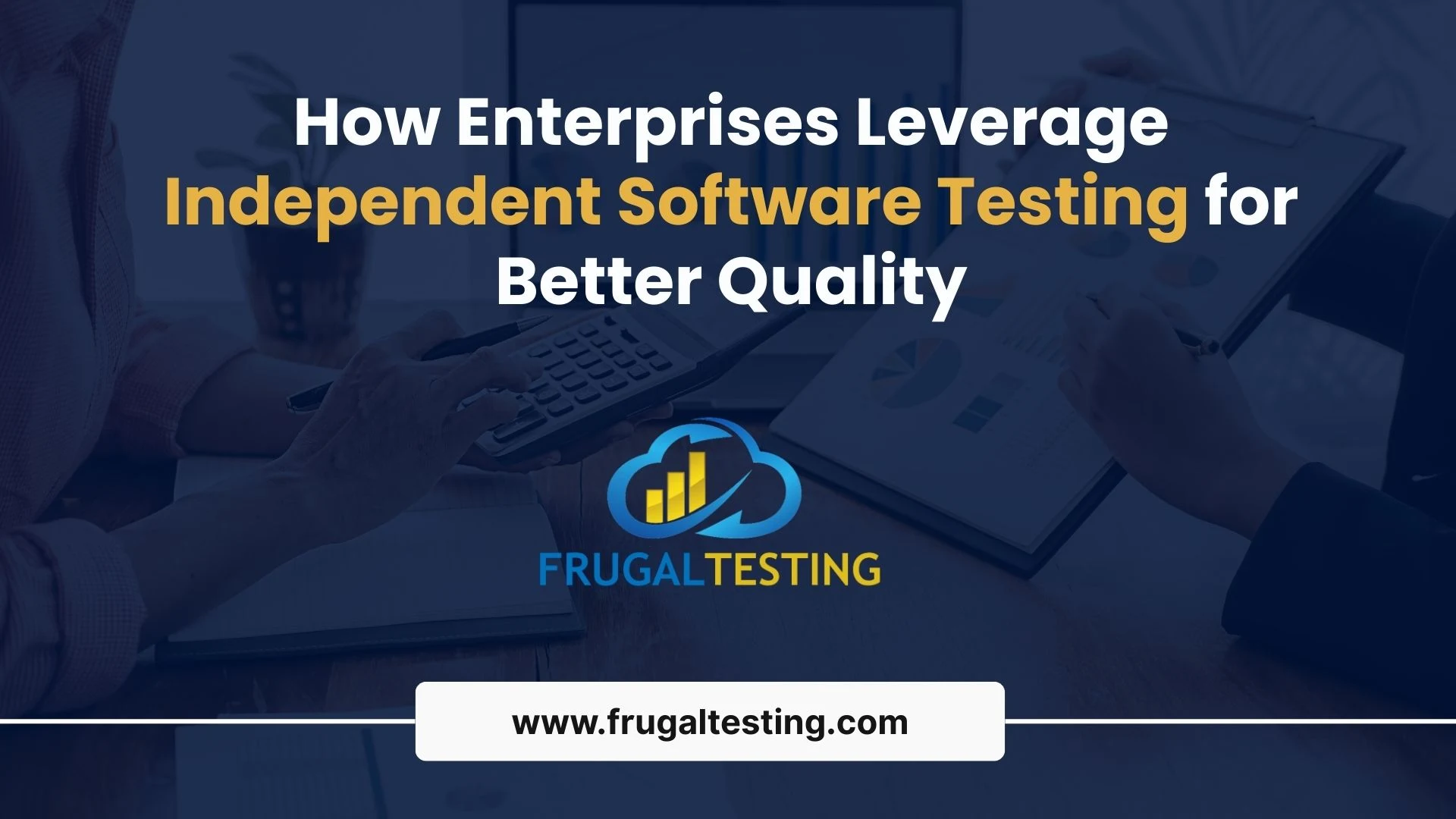

%201.webp)
